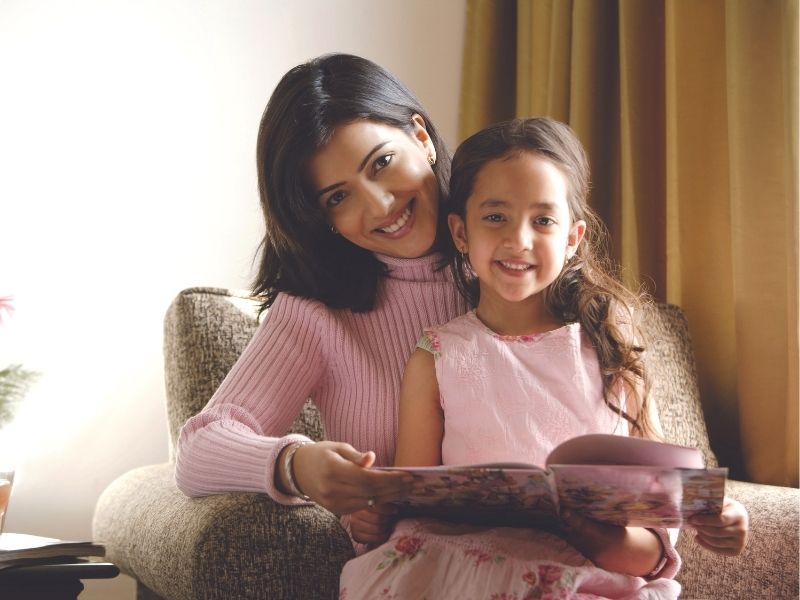Embrace gentle parenting to raise happy, confident children
Aruna Raghuram
“When we are gentle with our children, we model and help create the inner voice that will accompany them through their lives.”
– Dr. Allison Andrews, well-known American psychologist

Picture this scene. Four-year-old Asha has thrown a huge temper tantrum and is bawling as she lies on the kitchen floor. Her exasperated mother Renu picks her up and takes her to her room. “That’s it. You will stay in there until you learn to behave,” says Renu. Asha has been grounded for bad behaviour.
But locking her up will be counterproductive because Asha is too young to understand and cope with her fluctuating emotions without the help of her parents. And, when she needs it the most, her mother has cut off all communication with her. Confused and miserable, she continues crying softly.
Parents who subscribe to ‘gentle parenting’ would have intervened very differently in this situation. They would have given Asha a ‘time-in’ instead of a ‘time-out’ by examining the causes that triggered her tantrum and helped her self-soothe. This would have enabled her to regulate her emotions — a vital life skill — in future.
Gentle parenting
Gentle parenting is defined as “a positive parenting approach based on gentleness”. It involves guiding rather than controlling children. It is the antithesis of authoritarian parenting where parents micro-manage children’s lives. In gentle parenting, children are partners who are given choices and empowered to make decisions.
However it should not be confused with permissive parenting, when discipline suffers as parents attempt to please children to prevent tantrums and conflict. Gentle parenting is dissimilar to ‘authoritative’ parenting in that a child is given respect and consulted before decisions are taken. It is congruent with ‘attachment’ parenting where the focus is on creating a secure, trusting bond between parent and child. But there is more to gentle parenting than these two styles.

Comments Dr. Meghna Singhal, a Bengaluru-based clinical psychologist and internationally certified positive parenting coach: “Gentle parenting involves unconditional love and acceptance of one’s child without the use of harsh disciplining and punishment. When children misbehave, they are actually struggling to regulate their emotions. Accept your child’s emotions. Don’t deny or undermine them as it will give your child the message that some emotions are shameful and unacceptable. Instead, let children know that experiencing the full range of human feelings is normal and natural, even while some actions must be limited. This is the essence of gentle parenting.”
Dr. Singhal provides an example of how parents can use gentle parenting effectively. “Instead of saying, ‘STOP playing and come for dinner NOW,’ you can try saying, ‘I know it’s hard for you to stop playing and come for dinner.’ Your child may have to do what you say, but you have shown her that she’s entitled to her own perspective. This will make her more willing to comply,” she explains.

However Sushant Kalra, parenting coach and founder of the Delhi-based Parwarish Institute of Parenting, warns that the term ‘gentle parenting’ can be misleading. “It could mean a parenting style where tough stances cannot be taken even when warranted. I would rather use the term ‘concerted parenting’ — like a concert, where several instruments are playing in harmony. Parents need to believe that their child is capable of achieving great things given the required exposure and time. And, they need to communicate this belief to their child. Second, parents need to respect the effort their child has put in as well as the result. In a competitive world, parents need to be patient and gentle when their child errs,” he says.
Four tenets
On her website sarahockwell-smith.com, British parenting expert and author of The Gentle Parenting Book: How to Raise Calmer, Happier Children from Birth to Seven (2016), Sarah Ockwell-Smith, describes gentle parenting in a nutshell: “In my opinion it can be summed up with just four words: empathy, respect, understanding and boundaries.”
Ockwell-Smith says gentle parenting means placing yourself in your child’s predicament and acknowledging that your child deserves respect just as any adult does. “Gentle parenting means making an effort to understand your child’s communication style and behaviour and also keeping in mind what is appropriate for a certain age. It means, that you put in place and enforce boundaries consistently which gives your child a feeling of security. Gentle parenting is more a way of ‘being’ than ‘doing’,” she says.
Benefits
Dr. Singhal believes that gentle parenting produces confident and emotionally well-balanced children with healthy self-esteem. “When parents are gentle and kind in their parenting, children learn and emulate their parents’ calm and generous behaviour. Many parents tend to make the grave mistake of labelling the less than desirable behaviour of children as manipulation or mischief which needs to be mended. They overlook root causes of bad behaviour. In gentle parenting, parents understand and address the root cause of children’s fears and disaffection,” she explains.
With social media becoming ubiquitous and children confronted with a deluge of age-inappropriate information, Kalra argues that gentle parenting is imperative for latter day parents. “Today children have information overload. They are exposed to sex, alcohol and drugs from young age. Parents can’t be with their children all the time to protect them. Instead, they need to empower children to make informed decisions. They can’t be policemen; they can’t adopt a parenting approach that is authoritarian and harsh. Second, today’s children want answers. They are more responsive to discussion and reasoning. For instance, a child is more likely to apply her mind to a task if a parent gives her a convincing reason why it’s important and how she would benefit,” explains Kalra.
Gentle parenting is hard work. Therefore parents need to be gentle with themselves first. It requires them to exercise self-control in difficult situations. But the results are well worth the effort — calm, independent, confident, empathetic, happy children!
GENTLE PARENTING PRIMER
- Parent children in a gentle (firm yet flexible) and consistent manner
- Develop strong emotional bonds with children
- Children should be given choices instead of commands. Humour and playfulness can bring about ‘positive discipline’
- The ‘natural rhythms’ of a child should be followed instead of strict daily routines
- Children’s ‘bad behaviour’ is an opportunity to learn from mistake
- Rewards and praise are unnecessary as good behaviour needs to be internalised
- Punishment and ‘time outs’ are inadvisable. Parents should be ready and willing to apologise for their mistake
- Children must be empowered and encouraged to make age-appropriate decisions, to develop self-confidence and independence
- Children’s individuality and pace of development should be respected and accepted
- Instead of changing a child’s behaviour, gentle parents encourage her to build her unique strengths and capabilities

















Add comment